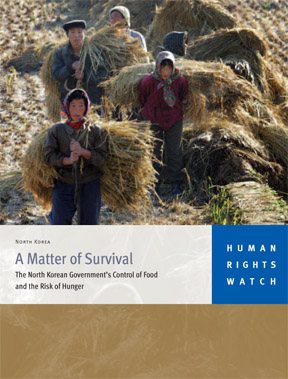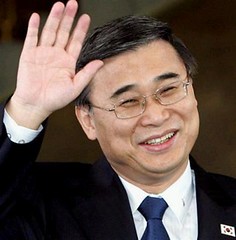NGO Warns of New Famine in N. Korea
 In the wake of North Korea’s decisions to kick out the World Food Program and reassert state control over food distribution, Human Rights Watch is warning that North Korea can’t feed its people, and that attempts to reconstitute its broken and discriminatory Public Distribution System could trigger a new famine.
In the wake of North Korea’s decisions to kick out the World Food Program and reassert state control over food distribution, Human Rights Watch is warning that North Korea can’t feed its people, and that attempts to reconstitute its broken and discriminatory Public Distribution System could trigger a new famine.
“Only a decade ago, similar policies led to the famine that killed anywhere from 580,000 to more than 3 million,” the group said in a statement released to reporters in Seoul. “Regressive policies “¦ could someday lead to a repeat of the food crisis in the 1990s.”
I’ve been banging this drum since last fall and personally raised the issue to Ambassador John Bolton last November. Sen. Sam Brownback raised the issue of food aid distribution in a letter to Amb. Bolton in March. I’m glad that the U.S. government and NGO’s are starting to pay attention, and hope that an effective international consensus will start to emerge while there’s still time, though I’m pessimistic. First, there won’t be consensus until we see images of starving kids, something that Kim Jong Il will succeed in preventing. Second, international consensus works on the level of the lowest common denominator, which means the “international community” will only agree on something completely spineless. That leaves regime extinction as the only real hope of saving these people.
The report couldn’t come at a more humiliating time for UniFiction Minister Lee Jong-Seok. Lee, who is embroiled in a public fight with the U.S. government and human rights advocates over food aid policy, has loosed a volley of stunning gaffes this week, including the suggestion that South Korea had single-handedly ended hunger in North Korea, and bizarre praise for Kim Jong Il’s “sound decisions.” Human Rights Watch has a different view:
“Hunger in North Korea has a strong state policy dimension,” the report said.
“In the past, the authorities have implemented the system in a discriminatory manner, distributing food and other goods to elites and preferred citizens while others went without.”
North Korea will distribute food to those it feels have supported the policies set by Pyongyang while those at the bottom of society have little access to state recognition, which means they will have few means to find food, it said.
Aid groups have said North Koreans in many parts of the impoverished country have not been receiving rations under the current system as food supplies have fallen far short of what is needed to feed its 23 million people.
 And what of Lee’s claim that no one starves in North Korea anymore? Not so, says HRW.
And what of Lee’s claim that no one starves in North Korea anymore? Not so, says HRW.
Even before the famine of the 1990s, the vast majority of North Koreans suffered from a deficit of food. Now, under improved circumstances, many still do. WFP’s most recent nutritional survey shows that many children under the age of six still have poor nutritional status; a significant percentage meets the criteria for a severe health concern. Among children under six they surveyed, 37 percent were stunted (too short for their age), 23.4 percent were underweight; and 7 percent were wasted. A report by WFP in late 2005 shows that following the government’s decision to fully reinstate the PDS, some households surveyed by WFP staff were receiving far less food than the average target ration of 500 grams per person per day, an amount nutritional experts regard as the minimum to maintain a normal level of health.
HRW also had some specific recommendations for Lee’s government:
Publicly and privately urge North Korea to guarantee the right to food and other basic rights. Condemn politically motivated discrimination in the allocation of food rations and oppose ongoing restrictions on free expression in North Korea that limit public access to critical information on food supplies. Urge North Korean officials to allow alternatives to the Public Distribution System to improve chances that all North Koreans will have access to a reliable and adequate supply of grain.
Insist on using internationally acceptable standards when monitoring the distribution of food aid to North Korea. Such standards include granting monitors access to the entire country and allowing them to select interviewees at random and make unannounced visits.
South Korea is often criticized for its direct aid to the North Korean regime without any effective monitoring of how its aid is used. What many of us suspect is that World Food Program monitoring had become inconvenient for a regime that’s determined to keep its most discontented citizens too weak to resist. Carte-blanche aid from South Korea and China can be reserved for the privileged classes, meaning that it sustains the regime, does nothing for the hungry, and relieves the regime of any pressure to accept aid it would have to share with “class enemies.” That’s why there’s an international code of conduct for this sort of thing. Food should not be a weapon of political control, but in this case, it is:
North Korea has a long history of providing food on a priority basis, feeding the preferred class, such as Workers’ Party members and high-ranking military, intelligence and police officers, while discriminating against the so-called hostile class. If past patterns hold true this year, the government will first send food to “war-preparation storage” and preferred citizens, and only then to the general public through the PDS, leaving many North Koreans hungry.
Until the famine in the 1990s, food rationing was perhaps the single most important way of controlling the population in North Korea. As people could receive rations only from their place of work or study, the system largely kept the population immobile and obedient, so that they wouldn’t risk losing their only source of food.
HRW is calling for an end to the use of food as a weapon:
The North must end discrimination “in favour of party officials, military, intelligence and police officers and against the hostile class deemed politically disloyal to the government and the party,” Human Rights Watch said.
The report urged the North not to “punish those who are perceived as less politically deserving of state protection”.
Read HRW’s full 34-page report here.
2 Responses